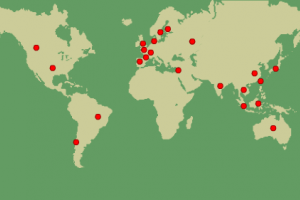By Global Justice Ecology Project
Large-Scale Tree Plantations
Industrial tree plantations are large-scale, intensively managed, even-aged monocultures, involving vast areas of fertile land under the control of plantation companies. Management of plantations involves the use of huge amounts of water as well as agrochemicals—which harm humans, and plants and animals in the plantations and surrounding areas.
Other information
17 December 2009
Other information
29 November 2009
There is nothing like creating a problem for finding a good business opportunity . Or at least this is so for seasoned business men and women. It is thus that behind wars one can easily find the arms business. Behind citizen insecurity -largely resulting from social and economic inequity- is the business of security: insurance monitoring systems, bars, alarms and heavy-handed “saviour” politicians. Behind disease is the “health” business: the drug industry and corporate medical power.
17 November 2009
Where? Which trees? What for? By who? Who support? Who regulates? Who oppose?
Research on genetically engineered trees is being currently carried out in a number of countries and yours can be one of them!
Bulletin articles
30 October 2009
The World Forestry Congress taking place in Buenos Aires is viewed as an excellent business opportunity by the Argentine forestry sector.
Other information
30 October 2009
Something extremely interesting is currently happening in Kenya. On the one hand, the country’s Environment Minister, John Michuki, has ordered the uprooting of eucalyptus trees from wetlands and banned their planting along rivers and watersheds.
Bulletin articles
30 October 2009
Uruguay and the Republic of Korea have recently signed an Agreement for Investment Promotion and Protection which, according to Uruguayan government authorities establishes a framework for Korean investment in Uruguay. From past experience in Uruguay, the establishment of a framework for investment in this country may mean reducing or eliminating all taxation, granting of foreign trade zone permits and all kinds of support to the company’s enterprises.
Bulletin articles
30 October 2009
World demand for paper and paperboard is expected to grow by 2% to 3% annually in the long term, with significant growth potential for Asia and Eastern Europe - India, China and Russia in particular. Paper pulp exports from Latin America from lands converted into monoculture tree plantations, so called “green deserts”, are expected to grow by 70% between 2000 and 2010.
Bulletin articles
30 September 2009
International Day against Monoculture Tree Plantations is a good opportunity to expose the myths being spread around about the so-called “benefits” of these plantations. Such myths have not arisen on their own but are the result of a long process during which people and institutions related to the corporate-plantation sector have invented arguments to convince both the general public and governments and institutions of the advisability of mass tree plantation.
Bulletin articles
30 September 2009
Plantations are forests in uniform. They look like soldiers all lined up in ranks, and that is what they are. Dressed in green, they march off to the world market. The hymns that sing their praises in the name of our Mother Earth are lies. Industrial forests are to natural forests what military music is to music, and what military justice is to justice.
Eduardo Galeano, writer, Uruguay
Bulletin articles
30 September 2009
Large-scale tree plantations do not generate jobs because they always involve as much mechanization as possible. For example, the Veracel Celulose Company in Brazil generates 1 direct job per 130 hectares of eucalyptus. On the other hand coffee plantations, very common in Brazil, are able to create up to one job per hectare.
Bulletin articles
30 September 2009
Why is this statement simply not true?
Monoculture tree plantations cannot ever improve on the natural environment that is eliminated when plantations are established.
Bulletin articles
30 September 2009
A typical propaganda disseminated by business interests and governments in many tropical countries is to say that plantations will relieve pressure on native forests. They claim that with enough plantations, native forests would eventually be left alone, as the plantations would provide sufficient wood to avoid the need of extracting timber from native forests.

